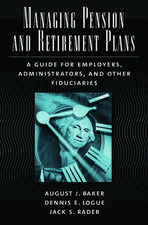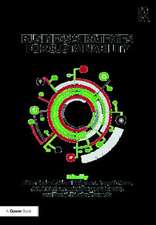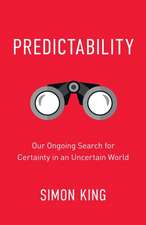The Foundations of Behavioral Economic Analysis
Autor Sanjit Dhamien Limba Engleză Paperback – 3 noi 2016
| Toate formatele și edițiile | Preț | Express |
|---|---|---|
| Paperback (8) | 151.26 lei 10-16 zile | |
| OUP OXFORD – 18 feb 2019 | 151.26 lei 10-16 zile | |
| OUP OXFORD – 18 feb 2019 | 188.20 lei 10-16 zile | |
| OUP OXFORD – 18 feb 2019 | 190.12 lei 10-16 zile | +54.35 lei 5-11 zile |
| OUP OXFORD – 15 iul 2020 | 234.31 lei 22-36 zile | +30.17 lei 5-11 zile |
| OUP OXFORD – 3 noi 2016 | 452.75 lei 10-16 zile | +140.44 lei 5-11 zile |
| OUP OXFORD – 16 dec 2019 | 229.77 lei 31-37 zile | |
| OUP OXFORD – 3 iul 2019 | 263.49 lei 31-37 zile | |
| OUP OXFORD – 24 dec 2019 | 312.67 lei 31-37 zile |
Preț: 452.75 lei
Preț vechi: 526.21 lei
-14% Nou
Puncte Express: 679
Preț estimativ în valută:
86.63€ • 90.69$ • 71.68£
86.63€ • 90.69$ • 71.68£
Carte disponibilă
Livrare economică 05-11 martie
Livrare express 28 februarie-06 martie pentru 150.43 lei
Preluare comenzi: 021 569.72.76
Specificații
ISBN-13: 9780198715535
ISBN-10: 0198715536
Pagini: 1798
Ilustrații: Numerous Figures and Tables
Dimensiuni: 189 x 246 x 61 mm
Greutate: 2.95 kg
Editura: OUP OXFORD
Colecția OUP Oxford
Locul publicării:Oxford, United Kingdom
ISBN-10: 0198715536
Pagini: 1798
Ilustrații: Numerous Figures and Tables
Dimensiuni: 189 x 246 x 61 mm
Greutate: 2.95 kg
Editura: OUP OXFORD
Colecția OUP Oxford
Locul publicării:Oxford, United Kingdom
Recenzii
It is many years since the subject of African economic development has been treated with the best insights and methods that modern social science has to offer. Cramer, Sender, and Oqubay have set a new standard in this respect.
The publication of this book is a landmark occasion for the field of behavioural economics. Until now there has been no comprehensive survey of the field suitable for graduate students. Professor Dhami has thoroughly and rigorously filled that gap. The book will be placed in a handy place in my office since I plan to consult it regularly.
The Foundations of Behavioral Economic Analysis offers a fascinating mix of theory and evidence and is the most comprehensive synthesis of behavioral economics at an advanced level. It will be very useful for advanced researchers as well as for graduate students in behavioral economics and beyond.
This book is a tour de force, a literal encyclopedia of behavioral economics. Its extraordinary breadth and depth, spanning all aspects from psychological foundations to the most recent advances and seamlessly integrating theory with experiments, will make it the must-have reference for anyone interested in this field, and more generally in where economics is headed. It will quickly become the standard textbook for all graduate courses in behavioral economics, and a much-thumbed companion for all researchers working at the frontier.
For someone like myself, who started by being ignorant of the richness of the conversation within behavioral economics on a variety of issues, this magisterial volume is the ideal introduction, at once lucid and sophisticated.
In Foundations of Behavioral Economic Analysis, Sanjit Dhami offers the first summary and exposition of research in this rapidly growing and increasingly influential subfield. The coverage is comprehensive, extending even to the recent subtopics of behavioural welfare economics and neuroeconomics. The book is distinguished by its detailed yet readable coverage of theory and evidence and its balanced discussion of the philosophical and methodological differences and similarities between behavioural and neoclassical approaches to microeconomics. Select undergraduates, graduate students, and interested scholars will all gain from this masterful book.
Economic theory in the twentieth century developed an extremely powerful repertoire of analytical techniques for studying human behavior.Sanjit Dhami has performed a monumental task in consolidating this research and explaining the results in a rigorous yet accessible manner, while highlighting major controversies and sketching the central research questions facing us today.
In the development of any field there comes a moment where the results already established must be synthesized, explained and consolidated both for those in the field and those outside. In this amazing volume Sanjit Dhami has done just that and far more. This book will serve as an encyclopedic must-have reference for anyone seeking to do work in this field or just curious about it. The coverage is exhaustive and the exposition extremely clear and at a level suitable for advanced undergraduates, graduate students and professionals. This is truly an achievement.
Displaying wit and wisdom, in Foundations of Behavioral Economic Analysis Professor Dhami conveys both the substance and the excitement of the burgeoning field of behavioral economics. This remarkable volume will serve as a reference for practitioners and a compelling entry-point for the curious.
This is a unique and truly remarkable achievement. It is a magnificent overview of behavioral economics, by far the best there is, and it should define the field for at least a generation. But it is much more than that. It is also a brilliant set of original discussions, with pathbreaking thinking on every important topic. An invaluable resource for policymakers, students, and professors - and if they want to try something really special, for everyone else.
The expansion of behavioral economics during the past twenty years has been remarkable, much of it concerning strategic interaction and using tools from game theory. Sanjit Dhami's amazing book summarizes - and even defines - the field, broadly as well as in depth. His coverage of theory as well as of experiments is superb. The Foundations of Behavioral Economic Analysis will be an indispensable resource for students and scholars who wish to understand where the action is.
Sanjit Dhami's Foundations of Behavioral Economic Analysis is a major and most impressive achievement. It provides an exhaustive account and a masterful synthesis of the state of the art after more than three decades of behavioral economics. For many years to come it will be an indispensable reference for researchers in economics and psychology, and it is bound to become the standard text in graduate and advanced undergraduate courses on behavioural and experimental economics.
This is the most complete and stimulating book on behavioral economics. With elegance and unprecedented elaborateness, it ties together a wealth of experimental findings, rigorous theoretical insights and exciting applications across all relevant fields of behavioral research. Sanjit Dhami's work has been shaped by numerous comments from the leaders in the field. Now, in the years to come, it will be the standard that shapes how the next generation of students and researchers think about behavior and its science.
This book covers all relevant theoretical aspects of behavioral economics in great depth. A great strength is its comprehensiveness: it covers the whole field. The book thus is unique in bringing to the fore the unity and diversity of the behavioral approach. The material is well-organized and accessible to a wide audience. It is invaluable to anyone teaching or studying any topic in behavioral economics, showing how the topic fits into the whole.
Foundations of Behavioral Economic Analysis will be a central textbook for behavioral economics. One key feature is its appealing focus on the interplay between theory and evidence. For researchers, it will be a great source of information, puzzles, and challenges for the many years to come. It is a major achievement.
Sanjit Dhami has spent more than 10 years on the monumental task to lay out the foundations of behavioral economics. The result is a major achievement. The book provides a comprehensive and encompassing survey and I think it will shape how the next generation of researchers thinks about the field. Overall, this is an excellent book that can be commended to advanced students of behavioural economics and to non-behavioural economics who are looking for an entry point into the field. It will also serve researchers in behavioural economics as an authoritative reference book. It is a must-have for anyone with a serious interest in the field.
The Foundations of Behavioural Economic Analysis is a major contribution to the contemporary economic studies in the areas of behavioural economics, psychology and game theory. It will remain as a major treatise on behavioural economics for many decades. I cannot think that another book will supersede this book in terms of rigour, comprehensiveness, and analytical sophistication in the foreseeable future. This book is also a very interesting and extremely useful publication for academic analysis, policy design and practical applications.
Almost all the chapters follow a basic structure: they sketch the neoclassical theory; review evidence on its empirical plausibility; introduce alternative behavioral theories; finally go on to discuss further evidence of the newer theories' relative successes and failures compared to the neoclassical theories. A lot of thought has gone into writing the introductions of each section as they outline the broad trends, debates, and core empirical results, making it easy to get into the detailed chapters with a clear idea of the direction of research in that topic.To sum it up, the book ends up doing exactly what it promised, take stock of behavioral economicscourse text for advanced students.., a research handbook for behavioral economists, and an invitation to economists and other social scientists of all persuasions to explore this exciting new field.
The publication of this book is a landmark occasion for the field of behavioural economics. Until now there has been no comprehensive survey of the field suitable for graduate students. Professor Dhami has thoroughly and rigorously filled that gap. The book will be placed in a handy place in my office since I plan to consult it regularly.
The Foundations of Behavioral Economic Analysis offers a fascinating mix of theory and evidence and is the most comprehensive synthesis of behavioral economics at an advanced level. It will be very useful for advanced researchers as well as for graduate students in behavioral economics and beyond.
This book is a tour de force, a literal encyclopedia of behavioral economics. Its extraordinary breadth and depth, spanning all aspects from psychological foundations to the most recent advances and seamlessly integrating theory with experiments, will make it the must-have reference for anyone interested in this field, and more generally in where economics is headed. It will quickly become the standard textbook for all graduate courses in behavioral economics, and a much-thumbed companion for all researchers working at the frontier.
For someone like myself, who started by being ignorant of the richness of the conversation within behavioral economics on a variety of issues, this magisterial volume is the ideal introduction, at once lucid and sophisticated.
In Foundations of Behavioral Economic Analysis, Sanjit Dhami offers the first summary and exposition of research in this rapidly growing and increasingly influential subfield. The coverage is comprehensive, extending even to the recent subtopics of behavioural welfare economics and neuroeconomics. The book is distinguished by its detailed yet readable coverage of theory and evidence and its balanced discussion of the philosophical and methodological differences and similarities between behavioural and neoclassical approaches to microeconomics. Select undergraduates, graduate students, and interested scholars will all gain from this masterful book.
Economic theory in the twentieth century developed an extremely powerful repertoire of analytical techniques for studying human behavior.Sanjit Dhami has performed a monumental task in consolidating this research and explaining the results in a rigorous yet accessible manner, while highlighting major controversies and sketching the central research questions facing us today.
In the development of any field there comes a moment where the results already established must be synthesized, explained and consolidated both for those in the field and those outside. In this amazing volume Sanjit Dhami has done just that and far more. This book will serve as an encyclopedic must-have reference for anyone seeking to do work in this field or just curious about it. The coverage is exhaustive and the exposition extremely clear and at a level suitable for advanced undergraduates, graduate students and professionals. This is truly an achievement.
Displaying wit and wisdom, in Foundations of Behavioral Economic Analysis Professor Dhami conveys both the substance and the excitement of the burgeoning field of behavioral economics. This remarkable volume will serve as a reference for practitioners and a compelling entry-point for the curious.
This is a unique and truly remarkable achievement. It is a magnificent overview of behavioral economics, by far the best there is, and it should define the field for at least a generation. But it is much more than that. It is also a brilliant set of original discussions, with pathbreaking thinking on every important topic. An invaluable resource for policymakers, students, and professors - and if they want to try something really special, for everyone else.
The expansion of behavioral economics during the past twenty years has been remarkable, much of it concerning strategic interaction and using tools from game theory. Sanjit Dhami's amazing book summarizes - and even defines - the field, broadly as well as in depth. His coverage of theory as well as of experiments is superb. The Foundations of Behavioral Economic Analysis will be an indispensable resource for students and scholars who wish to understand where the action is.
Sanjit Dhami's Foundations of Behavioral Economic Analysis is a major and most impressive achievement. It provides an exhaustive account and a masterful synthesis of the state of the art after more than three decades of behavioral economics. For many years to come it will be an indispensable reference for researchers in economics and psychology, and it is bound to become the standard text in graduate and advanced undergraduate courses on behavioural and experimental economics.
This is the most complete and stimulating book on behavioral economics. With elegance and unprecedented elaborateness, it ties together a wealth of experimental findings, rigorous theoretical insights and exciting applications across all relevant fields of behavioral research. Sanjit Dhami's work has been shaped by numerous comments from the leaders in the field. Now, in the years to come, it will be the standard that shapes how the next generation of students and researchers think about behavior and its science.
This book covers all relevant theoretical aspects of behavioral economics in great depth. A great strength is its comprehensiveness: it covers the whole field. The book thus is unique in bringing to the fore the unity and diversity of the behavioral approach. The material is well-organized and accessible to a wide audience. It is invaluable to anyone teaching or studying any topic in behavioral economics, showing how the topic fits into the whole.
Foundations of Behavioral Economic Analysis will be a central textbook for behavioral economics. One key feature is its appealing focus on the interplay between theory and evidence. For researchers, it will be a great source of information, puzzles, and challenges for the many years to come. It is a major achievement.
Sanjit Dhami has spent more than 10 years on the monumental task to lay out the foundations of behavioral economics. The result is a major achievement. The book provides a comprehensive and encompassing survey and I think it will shape how the next generation of researchers thinks about the field. Overall, this is an excellent book that can be commended to advanced students of behavioural economics and to non-behavioural economics who are looking for an entry point into the field. It will also serve researchers in behavioural economics as an authoritative reference book. It is a must-have for anyone with a serious interest in the field.
The Foundations of Behavioural Economic Analysis is a major contribution to the contemporary economic studies in the areas of behavioural economics, psychology and game theory. It will remain as a major treatise on behavioural economics for many decades. I cannot think that another book will supersede this book in terms of rigour, comprehensiveness, and analytical sophistication in the foreseeable future. This book is also a very interesting and extremely useful publication for academic analysis, policy design and practical applications.
Almost all the chapters follow a basic structure: they sketch the neoclassical theory; review evidence on its empirical plausibility; introduce alternative behavioral theories; finally go on to discuss further evidence of the newer theories' relative successes and failures compared to the neoclassical theories. A lot of thought has gone into writing the introductions of each section as they outline the broad trends, debates, and core empirical results, making it easy to get into the detailed chapters with a clear idea of the direction of research in that topic.To sum it up, the book ends up doing exactly what it promised, take stock of behavioral economicscourse text for advanced students.., a research handbook for behavioral economists, and an invitation to economists and other social scientists of all persuasions to explore this exciting new field.
Notă biografică
Sanjit Dhami is Professor of Economics at the University of Leicester. He studied at the Delhi School of Economics and the University of Toronto for his Masters, MPhil, and PhD degrees in economics. He has previously taught at the Universities of Toronto, Essex, and Newcastle. His research has mainly focused on behavioral economic theory and its applications. He has published on the axiomatic foundations of the various components of prospect theory, behavioral political economy using other-regarding preferences, behavioral time preferences, foundations of behavioral game theory, and applications in tax evasion, stochastic dominance concepts under other-regarding preferences, and in behavioral law and economics.



























